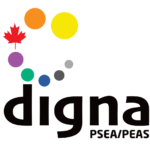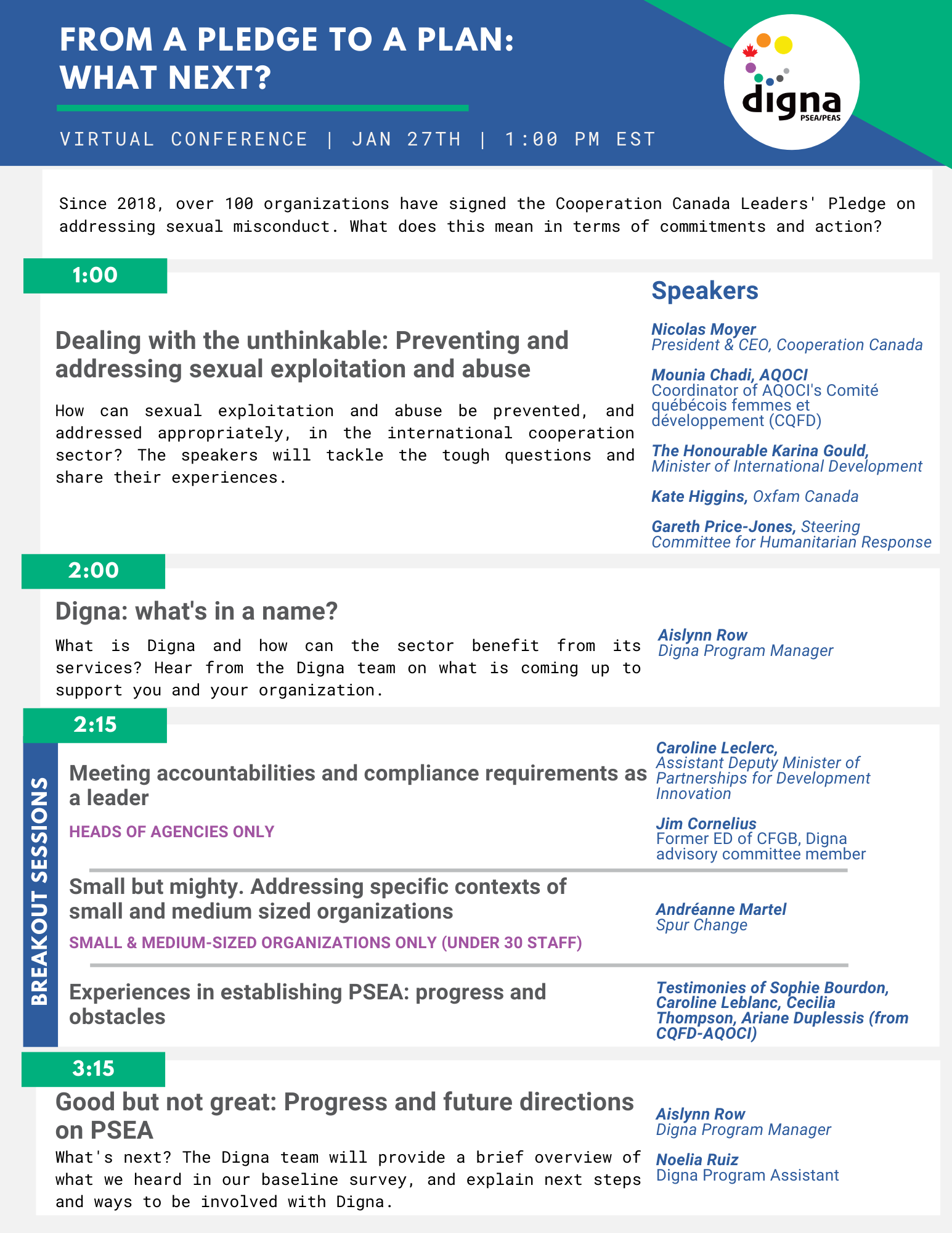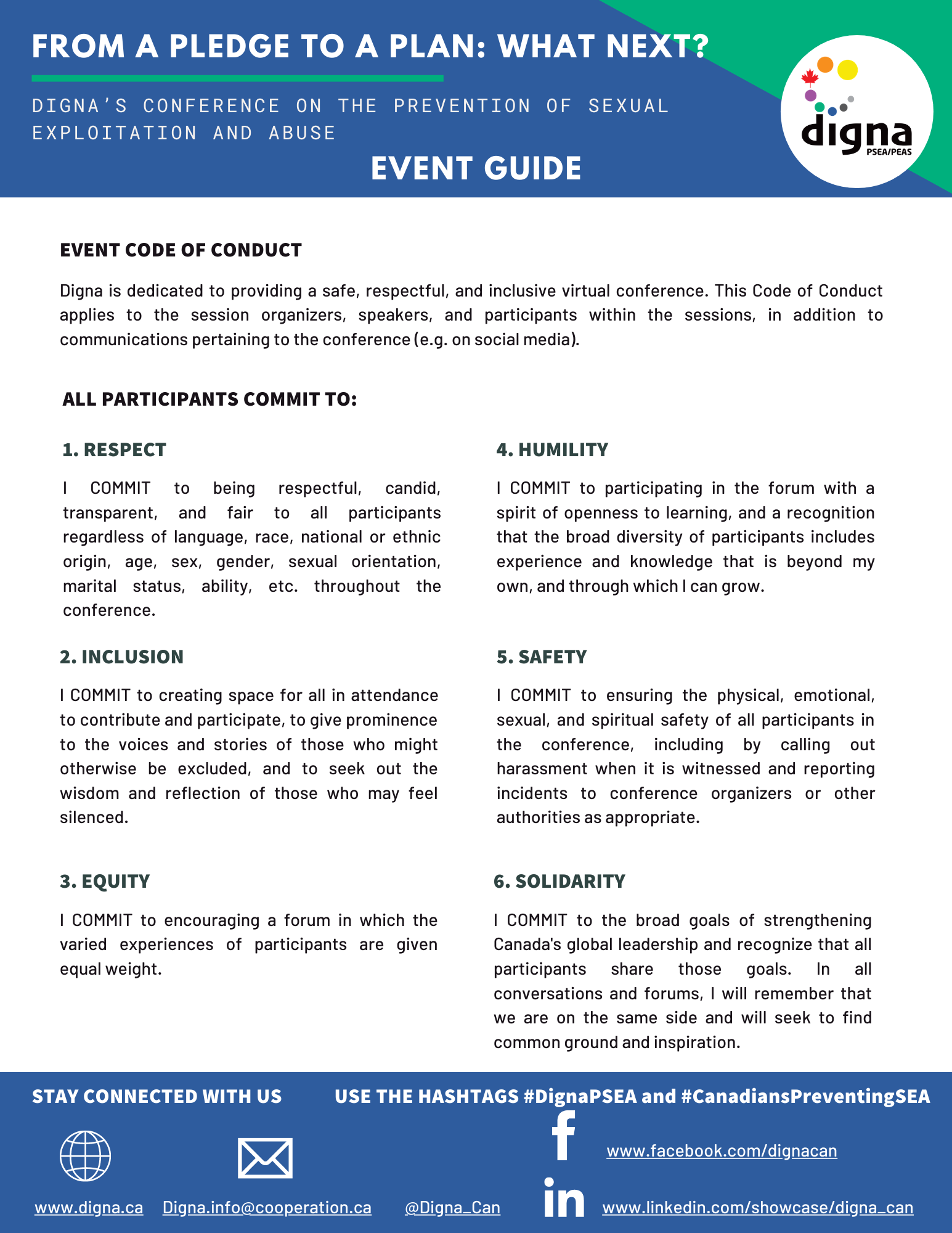From a Pledge to a Plan: What Next?
Digna's Launch
About the Conference
Digna’s virtual conference on how the international cooperation sector can prevent and address sexual exploitation and abuse took place on January 27th, 2021.
The conference included sector leaders, government officials, and PSEA champions who discussed how we as a sector can prevent and address sexual exploitation and abuse.
Plenary Session
Dealing with the unthinkable: Preventing and addressing sexual exploitation and abuse
Nicolas Moyer, president and CEO of Cooperation Canada, opened the discussion with land acknowledgements of the First Nations and called for the need for decolonization and to address the issue of missing and murdered Indigenous women and girls, including in the context of prevention of sexual exploitation and abuse (PSEA). Session facilitator and co chair of the advisory committee, Mounia Chadi, introduced the themes and topics surrounding PSEA and the various nuances that need to be addressed. Each panelist was then asked to share their experiences, understandings, and goals in the implementation of PSEA. The Honourable Karina Gould, Minister of International Development, addressed the corrosive nature of sexual exploitation and abuse (SEA), and the role of Canada on the matter; in its responsibilities both at home, and abroad in international development and humanitarian aid. Kate Higgins addressed the measures Oxfam has taken and put into place to confront the challenges they face within their organization. Gareth Price-Jones shed light on the challenges on policy implementation, inter-organizational coordination, and the need for proper staffing.
This hour of the conference concluded with Aislynn Row, program manager of Digna, who introduced Digna and the role they play in aiding the sector, and how they plan on doing so.
Quotes
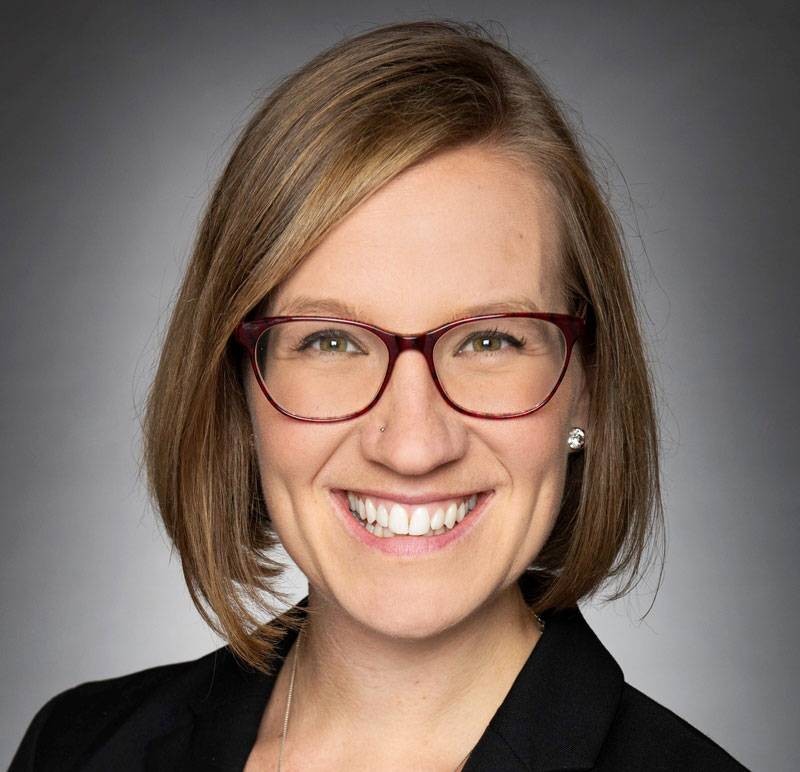
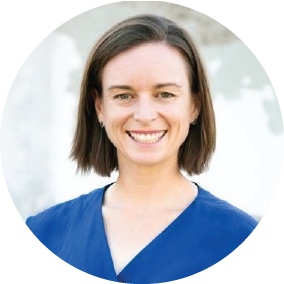

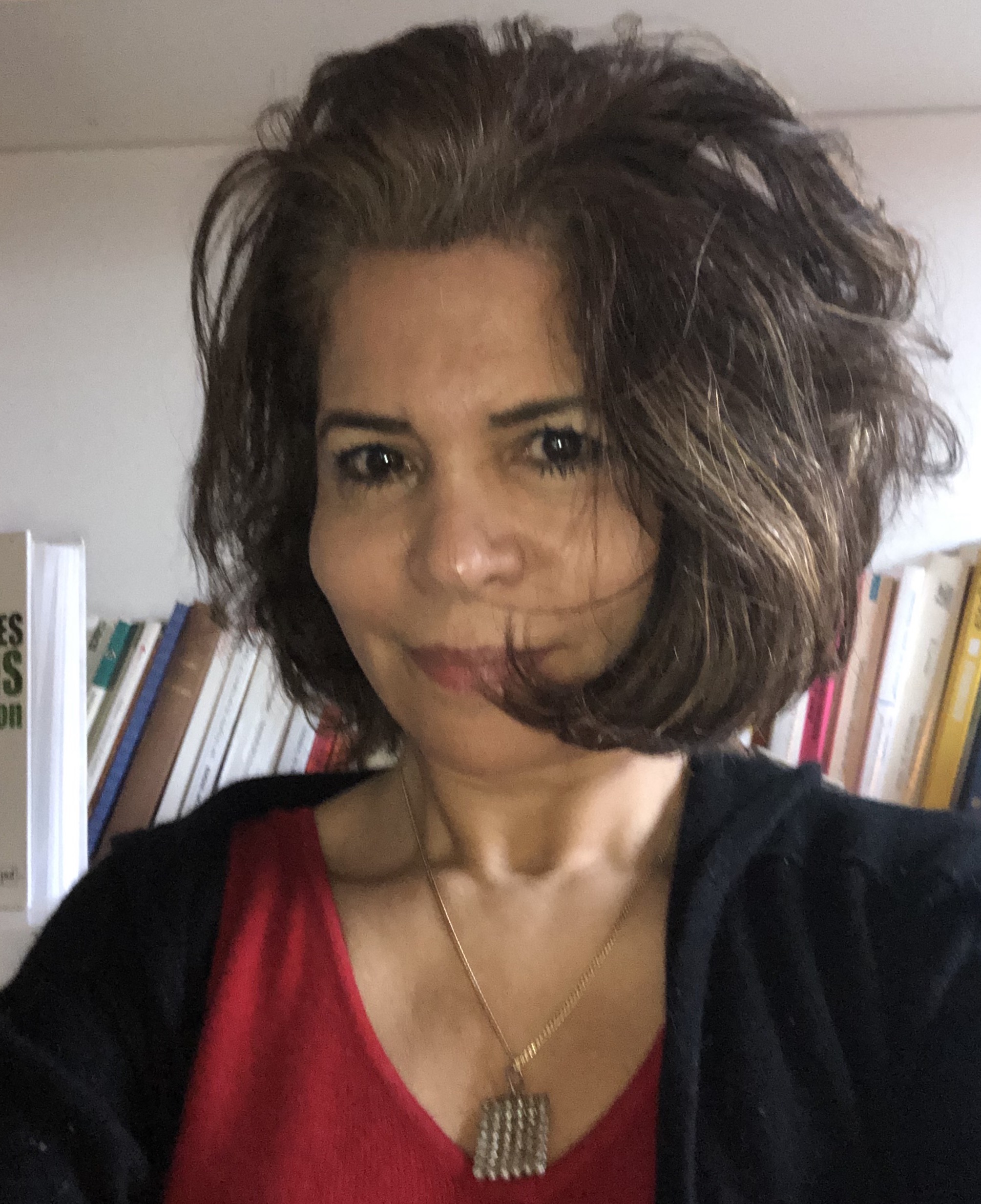
Breakout Sessions
Meeting Accountabilities and Compliance Requirements as a Leader
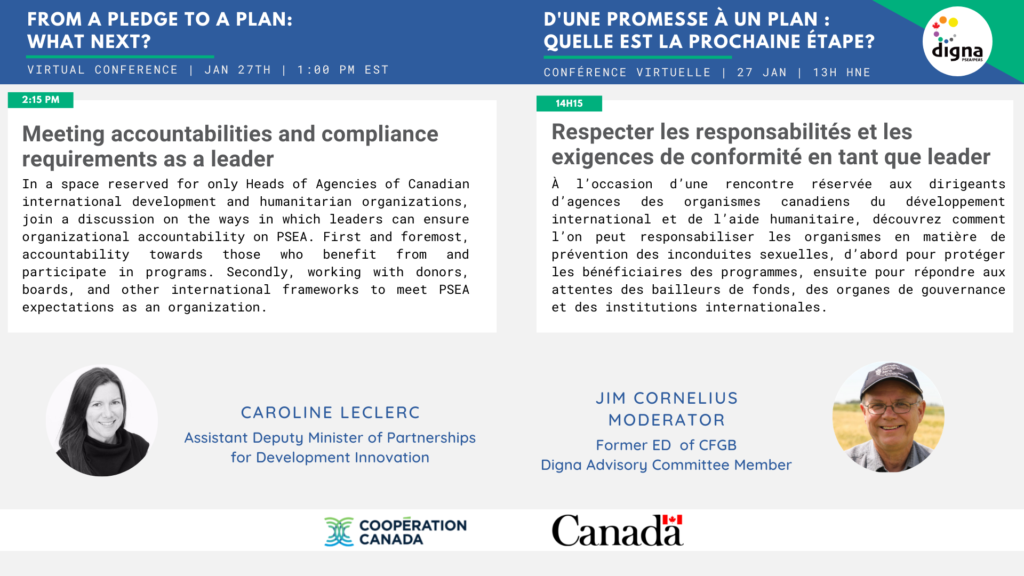
In a space reserved for only Heads of Agencies of Canadian international development and humanitarian organizations, over 40 leaders joined a discussion on the ways in which they can ensure organizational accountability on PSEA. First and foremost, accountability towards those who benefit from and participate in programs. Secondly, working with donors, boards, and other international frameworks to meet PSEA expectations as an organization.
Key takeaways:
Because this session was intended to allow open dialogue between leaders and Global Affairs Canada, it was not recorded. However, we are able to share some high-level insights from the rich discussion:
- Global Affairs Canada takes PSEA very seriously, and wants to ensure that all partners are compliant because this will enable more accountability to those who benefit from official development assistance in the countries in which partners work.
- Compliance with the requirement for a publicly available code of conduct that explicitly prohibits SEA is still not 100%, and allegations reported to GAC declined in 2020 as compared to 2019.
- GAC is working with partners in Canada to tackle this issue, as well as participating in global working groups to ensure international collaboration.
- Heads of agencies reiterated their commitment to PSEA, and highlighted some areas for collaboration on systemic issues:
- Collective responsibility requires collective efforts and resources for training, investigations, personnel management, and whistleblower reporting mechanisms.
- The role of boards in PSEA, and links to financial accountability systems.
- Ensuring that perpetrators are not allowed to move between organizations in the sector.
- The role of governments and the diplomatic community in countries of operation.
- Analyzing and responding to trends collectively, and in specific contexts.
Overall the conversation was constructive and demonstrated the collective efforts needed to effectively prevent and respond to sexual exploitation and abuse, and the commitment to doing so as a sector.
Small but mighty. Addressing the specific contexts of small and medium sized organizations
What does it mean to address sexual exploitation and abuse as a small organization? Spur Change and Digna created this session to provide a space for Small and Medium sized organizations (SMOs) for questions, answers, and support specific to their context.
The session started with an overview of the needs SMOs’ have regarding to PSEA from data collected in two different surveys. The session then continued with two presentations from Videa and Terres Sans Frontières. Terres Sans Frontières shared their experience and lessons learned implementing PSEA policies and practices. Then, the audience had the opportunity to participate in a polling where they ranked their PSEA training needs in order of relevance, and they commented how Spur Change and Digna can better support their organization.
PSEA Trainings in order of relevance to SMOs needs:

The following topics came out to answer how we can better support participants and their organizations to PSEA:
- Offering training opportunities, including training trainers and using different languages.
- More practical sessions – moving from policy to practice.
- Making resources available in various languages.
- Share what other SMOs are doing well.
- Working with partners.
- Help reviewing PSEA tools.
- Ability to ask questions by email and get quick responses.
Experiences in establishing PSEA: progress and obstacles
No one can address SEA alone, especially in the international cooperation sector. This session provided a space to discuss how organizations can implement PSEA, with a focus on ensuring that rights and reporting systems are communicated to those who benefit from programs in countries of operation.
The discussion focused on sharing best practices related to complaint mechanisms, the development of policies and procedures for in country-context and preventive measures related to survivor centered approaches.
Panelists shared progress and obstacles from five organizations in establishing measures to prevent sexual exploitation, abuse and harassment (PSEAH). The discussion focused on the challenges related to the development, implementation and adaptation of PSEAH policies to the local contexts of the projects.
The first panelist was Colombe Fourn, Program Officer responsible for gender equality and public engagement for the Fund for Innovation and Transformation (FIT). Colombe presented how the FIT promotes PSEAH with the organizations they fund. Thus, the FIT asks organizations that submit a project to have a policy or a code of conduct that establishes PSEAH. The FIT notes that the challenges related to establishing and implementing policies or codes of conduct related to PSEAH vary greatly from one organization to another. One of the issues identified is that the cultural context of local partners can be favorable to SEAH situations and make their prevention more difficult. The implementation of PSEAH policies on the ground also presents several challenges, such as adapting whistleblowing mechanisms to the local context and the difficulty of maintaining PSEAH as a priority in the context of the global pandemic.
The second panelist was Sophie Bourdon, Advisor on Gender Equality and Human Rights at CCISD. Her presentation led us to value not only the adoption of policies and mechanisms on PSEAH, but also to review these policies and mechanisms on a regular basis through a learning process. Sophie stressed the importance of bringing up the subject of watching and listening in PSEAH cases since 70% of survivors do not report cases of sexual violence. She invited us to develop human rights-based measures to shed light on power relations in societies and to seek to transform these relations.
The third panelist was Caroline Leblanc, Gender Equality Advisor for SOCODEVI. Her presentation focused on the process of creating training courses on PSEAH which is underway at SOCODEVI. Caroline explained that the purpose of the training was to ensure that their staff was adequately equipped to act quickly in PSEAH situations. The implementation of the PSEAH policy via the creation of a training course brings several challenges for SOCODEVI which are linked, for example, to the fact that there are six working languages in their organization and that training must be adapted to different local contexts.
The fourth panelist was Ariane Duplessis, Program Manager at Equitas. Her presentation shows how Equitas managed to bridge the gap between policy and practice. Therefore, how we can implement PSEAH policies to international cooperation projects. Equitas has chosen to create guidelines that include tools and a checklist of actions that should be in place before and during project activities. Equitas has communicated these guidelines to its staff and to its partner organizations while promoting dialogue with them regarding policy and actions that should be put in place in project activities. Equitas created a pilot project in five countries to assess the effectiveness of the PSEAH guidelines and policy implementation in the pilot project, while gathering staff feedback to improve these policies.
The last panelist was Cecilia Thompson, Project Manager at CECI. Her presentation identified the issues related to the adaptation of PSEAH policies to the cultures of the countries in which these policies are implemented. For example, understanding the national context is imperative, since terms such as “sexual harassment” have different definitions depending on the cultural context in which they are used. PSEAH policy training should also be adapted to the local context and local culture using examples from local communities, as relation of power and privilege may be different or even stronger in some countries. Finally, since the consequences and sanctions of SEAH may contravene local social acceptance standards, it is imperative to accompany policies with education to show why these policies are essential.
